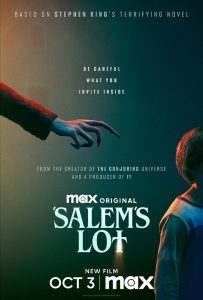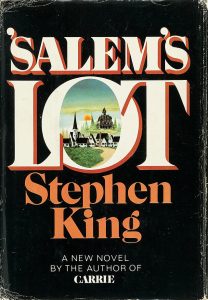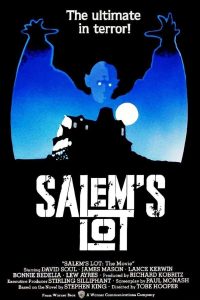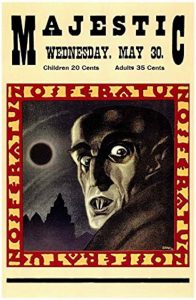Shadow of a Vampire: Arley Sorg and Josh Pearce Discuss ‘Salem’s Lot
 Salem’s Lot is the latest entry to the already extensive set of remakes, revisitations, spin-offs, and so on that are based on decades-old Stephen King stories. The list of these kinds of titles is substantial, and it includes 2017 film It with 2019 film It Chapter Two followed by upcoming prequel It: Welcome to Derry; 2019 film Pet Sematary and 2023 film Pet Sematary: Bloodlines; the admittedly very creative and pretty cool (though incomplete – ended on a cliffhanger, LOTS of questions never answered) 2017 TV series The Mist; and more. What the new Salem’s Lot has in common with all of these mentioned (and more) is that these renditions are not even the first film/TV adaptations. The original novel was published in 1975 – King’s second published novel, according to Wikipedia. Salem’s Lot came out in 1979 as a three-hour two-part miniseries. Even this was followed by later versions, sequels, and different kinds of remakes. In other words: there are remakes and then there are remakes upon remakes upon remakes.
Salem’s Lot is the latest entry to the already extensive set of remakes, revisitations, spin-offs, and so on that are based on decades-old Stephen King stories. The list of these kinds of titles is substantial, and it includes 2017 film It with 2019 film It Chapter Two followed by upcoming prequel It: Welcome to Derry; 2019 film Pet Sematary and 2023 film Pet Sematary: Bloodlines; the admittedly very creative and pretty cool (though incomplete – ended on a cliffhanger, LOTS of questions never answered) 2017 TV series The Mist; and more. What the new Salem’s Lot has in common with all of these mentioned (and more) is that these renditions are not even the first film/TV adaptations. The original novel was published in 1975 – King’s second published novel, according to Wikipedia. Salem’s Lot came out in 1979 as a three-hour two-part miniseries. Even this was followed by later versions, sequels, and different kinds of remakes. In other words: there are remakes and then there are remakes upon remakes upon remakes.
Released on Max in October 2024 as a Max Original to very mixed (read: mostly bad) reviews, Salem’s Lot follows author Ben Mears (Lewis Pullman), who returns to his fictional New England-ish hometown Jerusalem’s Lot. Ben hopes to be inspired enough to write another hit, but instead of inspiration he finds a vampire and his lackey are up to no good, killing people and taking over. He also finds an insta-romance with a fan, Susan Norton (Makenzie Leigh), mostly just by walking into a room. A fight for the town ensues, with several characters playing important roles in the battle.
Arley: So. Yeah. We have complained in other film reviews about remakes, and how this seems to be the era of rehash. I hadn’t planned to watch this one. I was in “not another fucking remake” mode. And then I just ended up randomly watching it, I didn’t have anything else to watch at the time. We’ll hear from you shortly, I’ll be curious to see what you have to say, but for me, I was pleasantly surprised. I mostly enjoyed it.
Josh: Oh, okay.
Arley: I did not expect to like it at all. Thought it’d be trite. It had enough things that I appreciated, so overall, I enjoyed watching it. I don’t think it’s brilliant or anything. But I was entertained.
Josh: So I have a hit-and-miss relationship with Stephen King properties, we’ve been over this before.
Arley: Yes. Same.
Josh: I think the adaptations are much better than his text because it just gets rid of his — I don’t know what to call it — just like, Stephen King bullshit. Which I guess some people like, but I just can’t get past it. Usually the films filter out enough of that so I can get the idea that he’s going for and it’s therefore generally enjoyable. This one I think was a miss for me.
Arley: Did you watch the original?
 Josh: I did not see the original Salem’s Lot so I don’t really have it to compare to, but that is one of the few Steven King books I’ve read all the way through, so I do know what “it’s supposed to be.” I just think that it felt like a streaming movie, and that’s what it was. Like the straight-to-Netflix movies that are cheaply made and they just don’t look good. So most of my complaints are with the quality of the filmmaking. The color palette was muddy or muted, and the acting was all over the place. Another problem I had is with the Salem’s Lot story. It’s a vampire story, but it’s such a basic vampire story. These days you can’t just do a vampire story without it being vampires and something else. You know, do vampires and something on top of it. Because I feel like the whole plot of Salem’s Lot is basically the back half of Dracula.
Josh: I did not see the original Salem’s Lot so I don’t really have it to compare to, but that is one of the few Steven King books I’ve read all the way through, so I do know what “it’s supposed to be.” I just think that it felt like a streaming movie, and that’s what it was. Like the straight-to-Netflix movies that are cheaply made and they just don’t look good. So most of my complaints are with the quality of the filmmaking. The color palette was muddy or muted, and the acting was all over the place. Another problem I had is with the Salem’s Lot story. It’s a vampire story, but it’s such a basic vampire story. These days you can’t just do a vampire story without it being vampires and something else. You know, do vampires and something on top of it. Because I feel like the whole plot of Salem’s Lot is basically the back half of Dracula.
Arley: Okay.
Josh: A vampire comes to town, and it’s converting everyone, and you have to go and stake it through the heart. I’ve seen that story a thousand times before. Even without seeing the original Salem’s Lot, I already know this plot. If you’re gonna do a remake of this movie, do something on top of it, which they didn’t. So I came away feeling like this is an unnecessary remake of a movie adaptation of an unnecessary novel to begin with.
Arley: Yeah, we had very different experiences. I don’t think many vampire movies are about entire takeovers of towns – there are a few, like 30 Days of Night, but even that is more about vampires eating their way through town than trying to convert a town. Usually vampires are hunting in isolation or small groups in larger populations. Okay for me, if it weren’t a remake, I would feel the same way about the general vampire concept as you. But because it’s a remake, I look at it as being within the context of horror of that era. And in that era, one of the things Stephen King was doing was he was bringing horror concepts into the everyday context. In other words, yes, it is the back half of Dracula or whatever, but it’s everyday people in a modern time. It’s not just rich people having these experiences in faraway or remote locations, it’s Dracula coming into your neighborhood, moving in down the street. I was engaging with it in that context, which I think changes the experience a little bit and I think it elevates it enough.
Josh: Also they remade it in 2024, but it’s still set in the ’70s. Which I kind of like, I don’t really like when they remake it and just bring it forward 50 years to catch up with the times. On the other hand, what does having a vampire in the ’70s add to anything? Not much now. You could just watch the original Salem’s Lot. Or if you wanna watch a vampire in modern times you could just watch Midnight Mass, which is essentially this movie but adds so many layers of religion, faith, and whatever on top of it, and better characterization than this did. We’ve already got options. Why is this the choice?
Alfre Woodard gives an energetic performance as Dr. Cody, lending credibility to every scene she’s in. As soon as things start to lean horror she also declares, sensibly, that she’s leaving. Despite this declaration, she doesn’t manage to leave – to the gratitude of the audience, which will only crave more of her presence in the film. Most of the cast’s lackluster delivery is made more apparent every time she is given room to shine.
Jordan Preston Carter does a decent job as Mark Petrie, a kid who is new to the area. We find him trying his best to fit in and make a good impression, which doesn’t go too well, and which many folks can probably relate to. Mark also has to deal with some of the clichés that come with being the new kid, such as a confrontation with the school bully and his followers. The film takes the standard scene in a somewhat new direction, effectively making Mark a kid you can root for. Similar to Edgar Frog (Corey Feldman) in The Lost Boys, Mark immediately accepts that vampires are real and uses things like comic books to source knowledge about them. This serves as a great tool to shorthand a lot of material, such as the rules for vampires. Unlike Edgar Frog, Mark is actually competent, and may have one of the higher kill rates in the film.
Spoiler alert – a special note for folks who read The Black Guy Dies First and are still keeping count: Woodard’s character dies a pointless, kind of random death, and Carter’s character actually makes it to the end.
Arley: I really liked the ’70s vibe here. They’re resetting it in the time of the original movie. It’s like they’re rebooting the original movie.
Josh: I kind of appreciated that it was in the ’70s, sure. The setting for The Black Phone really added an atmosphere to it. But in this one, it almost didn’t seem to matter. It could have been any time based on the way they did the storyline.
 Arley: I think if it were the same story in the now, it wouldn’t have worked for me. I think if that were the situation, I would have wanted them to do more. Because I’m engaging with it specifically as “Salem’s Lot,” looking back at the original movie. That was one of the few Stephen King movies that I really liked, back in the day. I haven’t seen it in a long time, but this was pleasuring all those nostalgia nerves. Well, while also updating it with a few choices that I appreciated. Like the choice of who is the protagonist, or I should say, the choice of who gets to act and have an impact in the narrative, and who survives at the end and who is taken out, things like that. The main thing that bothered me was that the main character is pretty annoying. Partially, I just don’t like it when the protagonist is a writer —at least make it some other kind of writer, other than a novelist.
Arley: I think if it were the same story in the now, it wouldn’t have worked for me. I think if that were the situation, I would have wanted them to do more. Because I’m engaging with it specifically as “Salem’s Lot,” looking back at the original movie. That was one of the few Stephen King movies that I really liked, back in the day. I haven’t seen it in a long time, but this was pleasuring all those nostalgia nerves. Well, while also updating it with a few choices that I appreciated. Like the choice of who is the protagonist, or I should say, the choice of who gets to act and have an impact in the narrative, and who survives at the end and who is taken out, things like that. The main thing that bothered me was that the main character is pretty annoying. Partially, I just don’t like it when the protagonist is a writer —at least make it some other kind of writer, other than a novelist.
Josh: I mean, it’s just gotta be the standard Stephen King, you know. Like, he’s a writer, and he’s got writer’s block, and he goes to do something and then some kids on bicycles go around and get into danger.
Arley: Yes. And he lives in Maine, or at least Maine-ish.
Josh: The main actor was good in Top Gun: Maverick which is the only thing I remember him from, but the whole time during Salem’s Lot I was like, is he on tranquilizers or something? He’s so… monotonous. Some people in this film – I felt like they were not acting at all. And then his girlfriend was overacting — I was like, you need to calm down. You were chewing the scenery and there’s nobody else in the room. Alfre Woodard was great, though.
Arley: A lot about the character concept is just authorial masturbation to me. I’m gonna have a writer who’s the main character, and I’m going to have, you know, a young woman fawning over him, and instantly interested in him romantically….
Josh: Yeah, their characters made no sense. I think they’re supposed to be the same age as each other, or close to the same age, but when they’re talking at the drive-in theater and giving their tragic back stories, or they’re talking in the library about his parents dying in a car crash, I was like, okay — is that gonna have any bearing on the story? And it didn’t, nothing mattered. Compared to Midnight Mass again, where everyone has a sob story in that, but it actually directly impacts what they do and how they react to the situation, and how they got to that island and that city, and it all matters. I keep bringing up Midnight Mass because it’s like Mike Flanagan’s version of a Stephen King story, it’s an illustration of how you can take a King style plot, adapt it to film, and actually have these elements present that were missing from this.
Arley: I feel like there were these little moments of nuance which updated the film, while still sticking mostly to the original flow. The setup, when they introduce Mark, and his character utilization is one of those decisions. Alfre Woodard is a fresh decision. The car trunks is a fresh decision. And I think maybe it just depends on if the nuances speak to you or not.
 Josh: Yeah, I suppose. I feel like these nuances are pretty nuanced, to the point where I don’t think they’re adding enough for me to recommend this movie, or to as a reason to watch a remake. But I guess mileage may vary.
Josh: Yeah, I suppose. I feel like these nuances are pretty nuanced, to the point where I don’t think they’re adding enough for me to recommend this movie, or to as a reason to watch a remake. But I guess mileage may vary.
Arley: Yeah. A lot of viewers agree with you, based on other reviews and ratings. For you it didn’t work. For me it was kind of powerful in some ways.
Josh: I really lost the thread of this movie when it became a comedy 2/3 of the way in. It was like the end of the second act, basically. They’re in the morgue, the kid’s mom is on the slab, and it’s the doctor and the main guy and his girlfriend. And the corpse starts to come alive — so they try to make a cross out of the tongue depressors. In a panic they’re like, “It’s not working! Bless this cross!” I’m like, what is happening here? It just went slapstick, they were falling over each other and I was legit laughing. But I don’t think they were intentionally trying to make it funny; and then the rest of the movie had just that kind of humor behind it. Especially in the drive-in scene, when the sun’s going down behind the screen, you can see the shadow moving and sometimes the shadows move really fast and then it stops, and then it keeps going. And then it slows down, and it speeds up again — like, what is happening to the sun? What is going on here? There’s a Roger Ebert review of The Mummy Returns where he talks about the protagonist having to outrun the sunset with a kid in his arms — which means he’s running and staying ahead of sunset, so he’s running 1,000 miles an hour. The shadow in Salem’s Lot had to be intentional because you know that shadow is not real, you’re either adding it in or you’re time lapsing. It’s one thing to unintentionally fuck up, but you put this in on purpose, you made a decision to do it wrong. I was also disappointed with the vampire itself. I wanted more of the vampire and more like, horror from the vampire. I was kind of surprised when he popped out in that house, but he looks kind of weird, not scary. And then his final fight or final death was anticlimactic. That was a disappointment too. If you’re going to have a creature movie, have a cool creature at the end.
Arley: I agree that the final kill was pretty anticlimactic. But I felt like the movie was somewhat going for light-camp. A lot of the stuff that you’re talking about, for me, it was consistent with that, like the tongue depressors scene. Otherwise — there’s no way they would film that tongue depressors moment without trying to be, to some degree, humorous. It’s just too funny. A lot of what the movie was doing worked for me and it didn’t work for you. And that’s fine.
Josh: At least it was free, so. I would have been really disappointed if I had been charged theater prices for this.
Arley: Yeah. You said you never saw the original movie.
Josh: It’s on HBO, but the original is over three hours long and I don’t know if I want to go into ’70s era Stephen King stuff.
Arley: I suspect that this movie might appeal mostly to people who like the original movie, but are not too strictly attached to the details — sometimes people get mad or dogmatic when certain things get changed. My two favorite scenes from the original Salem’s Lot are totally gone, for example. So I think people with that particular nostalgia, but in a relaxed way might like this? (Laughs) A very specific crowd! 5.6 out of 10 on IMDB, 46% tomatometer and 38% popcornmeter on Rotten Tomatoes — most people agree with you but a few will find it entertaining, too!
Directed by: Gary Dauberman
Screenplay by: Gary Dauberman, based on the novel by Stephen King
Starring: Lewis Pullman, Makenzie Leigh, Jordan Preston Carter, Alfre Woodard, Bill Camp, John Benjamin Hickey, Nicholas Crovetti, Spencer Treat Clark

Josh Pearce has published more than 200 stories, reviews, and poems in a wide variety of magazines, including Analog, Asimov’s, Beneath Ceaseless Skies, Bourbon Penn, Cast of Wonders, Clarkesworld, Diabolical Plots, Kaleidotrope, Locus, Nature, On Spec, Weird Horror, and elsewhere. Find more of his writing at fictionaljosh.com. One time, Ken Jennings signed his chest.
ARLEY SORG, Senior Editor, has been part of the Locus crew since 2014. Arley is an associate agent at kt literary. He is a 2022 Kate Wilhelm Solstice Award recipient and a 2023 Space Cowboy Award recipient. He is also a 2021 and 2022 World Fantasy Award finalist and a 2022, 2023, and 2024 Locus Award finalist for his work as co-Editor-in-Chief at Fantasy Magazine. Arley is a 2022 Ignyte Award finalist in two categories: for his work as a critic, and for his essay “What You Might Have Missed” in Uncanny Magazine. He is Associate Editor and reviewer at Lightspeed & Nightmare magazines, columnist for The Magazine of Fantasy and Science Fiction, and interviewer at Clarkesworld Magazine. He grew up in England, Hawaii, and Colorado, and lives in the SF Bay Area. A 2014 Odyssey Writing Workshop graduate, Arley has spoken at a range of events and taught for a number of programs, including guest critiquing for Odyssey and being the week five instructor for the six-week Clarion West workshop. He can be found at arleysorg.com – where he ran his own “casual interview” series with authors and editors – as well as Twitter (@arleysorg), Blue Sky, and Facebook.
 While you are here, please take a moment to support Locus with a one-time or recurring donation. We rely on reader donations to keep the magazine and site going, and would like to keep the site paywall free, but WE NEED YOUR FINANCIAL SUPPORT to continue quality coverage of the science fiction and fantasy field.
While you are here, please take a moment to support Locus with a one-time or recurring donation. We rely on reader donations to keep the magazine and site going, and would like to keep the site paywall free, but WE NEED YOUR FINANCIAL SUPPORT to continue quality coverage of the science fiction and fantasy field.
©Locus Magazine. Copyrighted material may not be republished without permission of LSFF.







